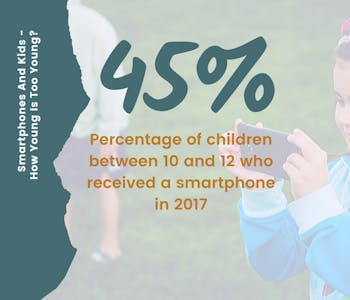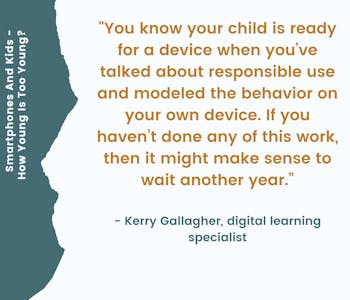For modern parents the smartphone question is often not a matter of “if,” but “when.”
Today schools are filled with kids tapping away on various devices from iPhones that cost over $1,000 to special “parent-friendly” phones designed for children. A new industry has spawned around parents whose concerns range from staying connected to their kids to moms and dads who want their kids to “fit in” with the latest tech.

No matter what your priorities are, the smartphone question will likely come up in your home sooner than you’d expect. Use this guide to figure out when (or if) your children are ready for smartphone ownership.
What do the stats say?
Even in our connected age, some parents are blown away by the concept of a child owning a phone. Many of us remember a world without smartphones, and some of us can even recall the pre-cellphone days. Functionality is the main difference between smartphones and cell phones: smartphones can access the internet and contain all kinds of applications (“apps”) while cellphones are limited largely to calling and texting. In 2019, 81 percent of Americans own a smartphone.
Apple, the manufacturer of the iPhone, sells close to 600 iPhones every minute. And a significant chunk of those are being purchased for children: 2017 statistics show that 45 percent of children between the ages of 10 and 12 received a smartphone that year.

Interestingly, the age distribution among those kids is not quite what you’d expect: of the children who received smartphones in 2017 the majority were 10 years old and the percentage dropped as kids got older.
The takeaway from these stats is clear: nearly 50 percent of all kids own smartphones. That percentage is bound to grow as the technology becomes more widespread, affordable and common.
What do the experts think?

There are plenty of opinions floating around on this topic. Even Bill Gates, the founder of tech giant Microsoft, has weighed in with his family smartphone rules (no phones until age 14, in case you’re wondering). But according to the American Academy of Pediatrics, there isn’t any particular age that’s “right” for getting a smartphone. Researchers from several other prominent organizations, like the Harvard Graduate School of Education, say the same thing.
Instead of thinking solely about age as a marker of preparedness, researchers suggest looking at your child’s tendencies overall. Ask yourself:
- Is my son/daughter responsible and aware?
- Do they know how to safely use shared technology, like the family computer?
- Are they ready to remember and follow guidelines about smartphone usage?
- Who will my child contact with their smartphone - are the people in their social circle kind and uplifting?
- Do I need to closely monitor my child’s messages and social media usage? If so, how can I do that in a respectful way?
- How will having a smartphone impact my child’s productivity and schedule?
Kerry Gallagher, a digital learning specialist quoted in the Harvard Graduate School research, says “you know your child is ready for a device when you’ve talked about responsible use and modeled the behavior on your own device. If you haven’t done any of this work, then it might make sense to wait another year.”

In addition to the questions above, it’s helpful to:
- Speak about technology early and often with your kids
- Emphasize face-to-face communication and bonding over texting and social media
- Come up with rules and guidelines together for smartphone usage
Choosing a phone for your child

If your child only needs a phone to get in touch with you every once in a while, a basic cell phone is probably the best choice. Cell phones are inexpensive, simple to use and don’t require lengthy or pricey contracts. They’re also a great starter option for younger kids.
Smartphones are good for keeping your family connected, but these devices are also a conduit to the internet, gaming and social media. Before buying your child a smartphone, discuss the safety basics of each of these topics with them. Learn more about the subjects you should cover with them here.
Once you’ve laid the groundwork for successful smartphone use, you can get into the “fun” part of choosing a phone for your child. We won’t dive into specific kinds of phones here, but if you’re concerned about your child having a fully-functional smartphone, know that child-friendly options exist. Some highly customizable phones even allow you to block certain apps and sites.
My child isn’t ready for a phone...now what?
You know your child best. If they’re not ready, don’t feel pressured to buy them a phone just because their peers have one or because they’ve reached a certain age. Instead work on building good habits together and establishing trust. Do meaningful activities together, like spending time outside, learning something new or reading a good book.

If your child begs you for a phone, set some milestones together so that they can prove they’re ready. These can be basic goals like consistently finishing chores or achieving good grades in school. And even if your child is responsible, it doesn’t hurt to set minimum requirements for their smartphone access. The overall goal is to help your kids safely and responsibly use their devices - not to force them to use a device they aren’t ready for.
Finding the Right Balance
Balance is key for developing minds. If you feel that your child is responsible and ready for a smartphone at 10, then go for it - just make sure that you communicate openly and have a system for monitoring certain activities.

Help your kids find balance in their lives by:
- Doing fun things as a family
- Encouraging their interests
- Spending time on a variety of activities (some that involve screen time and some that don’t)
- Reading and learning together early and often
As your kids grow, you'll probably have to revisit your family smartphone strategy to find the right mix of autonomy and oversight. At every age, use your good judgment and seek advice from others to figure out what works for your family - smartphone, cell phone or no phone, you’ll know what’s best for your kids!
Want more parenting content? Check our free eBook on parenting in the digital age.
